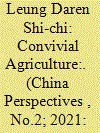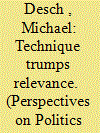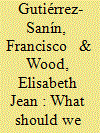|
|
|
Sort Order |
|
|
|
Items / Page
|
|
|
|
|
|
|
| Srl | Item |
| 1 |
ID:
181896


|
|
|
|
|
| Summary/Abstract |
The Chinese community-supported agriculture (CSA) movement is notable for advocating a revival of peasant farming and food sovereignty. For the emerging food politics in China, the main focus is the promotion of “ethical” food in the context of food scares. Currently this promotion often relies overwhelmingly on an emphasis of ethics of trust through certification of food by intermediaries. Yet, there is controversy among CSA activists, who question whether a certifying practice can improve the relationship between consumer and producer. This paper will present an emerging alternative approach within Chinese CSA circles that focuses on strengthening participatory culture within the consumer-producer nexus. To do so, I will shed new light on the experience of food and farming activism in South China since the late 1990s. The main focus is an empirical study of Chengxianghui (CXH), an organisation that operates various consumer-led action groups in Guangzhou. In order to conceptualise the approach by the activists, this paper outlines a normative framework referred to as “convivial agriculture” that is based on the Guangdong-based practice of the Participatory Guarantee System (PGS). The framework aims to recognise and negotiate responsibilities among different actors caring for the “agricultural commons.”
|
|
|
|
|
|
|
|
|
|
|
|
|
|
|
|
| 2 |
ID:
140205


|
|
|
|
|
| Summary/Abstract |
I explain here the disconnect between our discipline's self-image as balancing rigor with relevance with the reality of how we actually conduct our scholarship most of the time. To do so, I account for variation in social scientists' willingness to engage in policy-relevant scholarship over time. My theory is that social science, at least as it has been practiced in the United States since the early twentieth century, has tried to balance two impulses: To be a rigorous science and a relevant social enterprise. The problem is that there are sometimes tensions between these two objectives. First, historically the most useful policy-relevant social science work in the area of national security affairs has been interdisciplinary in nature, and this cuts against the increasingly rigid disciplinary siloes in the modern academy. Second, as sociologist Thomas Gieryn puts it, there is “in science, an unyielding tension between basic and applied research, and between the empirical and theoretical aspects of inquiry.” During wartime, the tensions between these two impulses have been generally muted, especially among those disciplines of direct relevance to the war effort; in peacetime, they reemerge and there are a variety of powerful institutional incentives within academe to resolve them in favor of a narrow definition of rigor that excludes relevance. My objective is to document how these trends in political science are marginalizing the sub-field of security studies, which has historically sought both scholarly rigor and real-world relevance.
|
|
|
|
|
|
|
|
|
|
|
|
|
|
|
|
| 3 |
ID:
156159


|
|
|
|
|
| Summary/Abstract |
To leverage the full range of observed variation in patterns of violence toward the development and testing of theories of political violence, scholars need adequate conceptual foundations: what should we mean by a pattern of violence on the part of an armed organization? Scholars often distinguish degrees or levels or types of violence across organizations and conflicts, but definitions and measures vary sharply. We argue that patterns of violence are not reducible in ways often assumed in the literature: lethal violence is not a good proxy for the overall pattern, and differences in patterns are not well captured in the binary “terror” versus “restraint.” To address these concerns, we provide a new conceptualization of political violence, defining an organization’s pattern of violence as the configuration of repertoire, targeting, frequency, and technique in which it regularly engages. This approach adds precision to the documentation and analysis of political violence, clarifies the evaluation of rival theories, and opens up new research questions. We demonstrate its utility through an analysis of violence against civilians in Colombia, drawing on an original database of massacres, judicial proceedings, and other sources, and show that the concept of “pattern” helps bring ideology and politics back into the analysis of organized violence.
|
|
|
|
|
|
|
|
|
|
|
|
|
|
|
|
|
|
|
|
|